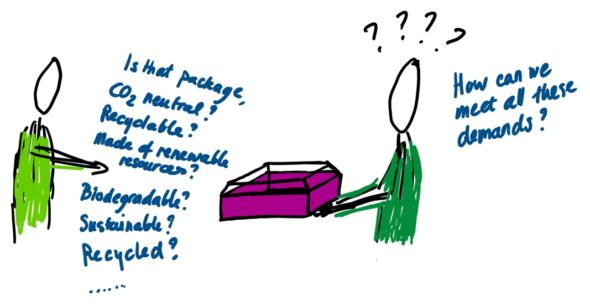Could understanding societal transitions as being partially organized help in finding ways to accelerate the transition towards sustainable food packaging?
Societal transitions, like the move towards sustainable food packaging studied in Package-Heroes, are nonlinear, disruptive systemic shifts. The actors in the system experience pressure to change from outside their system, for instance due to innovations or shifting norms and values.
The pressures on food packaging to move to more sustainable options are multiple. The pictures of plastic soup in the ocean have changed the general attitude towards the use of plastics, and it has created a demand for action to prevent littering and for the biodegradability of plastics. In addition, there is an increasing demand to act on the climate crisis by reducing CO2 emissions, using renewable resources, preventing waste and unnecessary packaging, and ensuring reuse and recyclability.

Change is incremental and slow – but possible
There are no easy, off-the-shelf solutions to meet all these demands. For instance, the reduction of plastic may lead to a higher degree of food waste. This food waste in turn results in a significant increase in CO2 emissions. New material innovations, which could be the answer to a combination of pressures, are not yet available on the scale needed, and are at a much higher cost. This means, that change is incremental and slow.
In recent work, I have with colleagues, looked at organizing that happens outside of formal organizations. We use the concept of ‘partial organization’ to explain this. Partial organization recognizes that there is much organization that happens outside of formal organizations. The concept of partial organization takes as its starting point that all organization starts from a decision on one organizational element, such as membership, authority, rules, monitoring or sanctioning.
A societal transition is normally not considered organized: there is no such thing as a membership of a transition. However, there are actors affected by and involved in the transition. The ability of these organizations to organize collectively affects the speed and the costs of the transition. For instance, a standard for what is sustainable packaging may help reduce R&D costs and, as well, may reduce costs for sustainable material due to higher volumes. Standards to harmonize and simplify sorting instructions on packages may also further help consumers to correctly sort packages and ensure better results in terms of recycling, while reducing the costs of creating such instructions for all the companies involved. Another way of partially organizing to accelerate action is to monitor changes and then publish these results, highlighting the steps in the right direction and showing where change is still needed.
Organizations need coordination and interaction
While organizations are normally unwilling to give up their autonomy, they need some level of coordination and interaction to find solutions and to be able to meet the goals they have set in terms of carbon neutrality, recyclability, material efficiency and reduction of plastics. Organizations affected may thus give up some of their authority and work through collaborations and associations to find solutions they are unable to create alone.
In Package-Heroes, I utilize these insights on partial organization to find ways to support and help accelerate the transition towards sustainable packaging.
Recently published work on partial organizations:
Laamanen, M., Bor, S., & Den Hond, F. 2019. The Dilemma of Organization in Social Movement Initiatives. In G. Ahrne & N. Brunsson (Eds.), Organization outside Organizations: The Abundance of Partial Organization in Social Life: 293–317. Cambridge: Cambridge University Press.
Laamanen, M., Moser, C., Bor, S., & den Hond, F. 2020. A partial organization approach to the dynamics of social order in social movement organizing. Current Sociology. https://doi.org/10.1177/0011392120907643.
